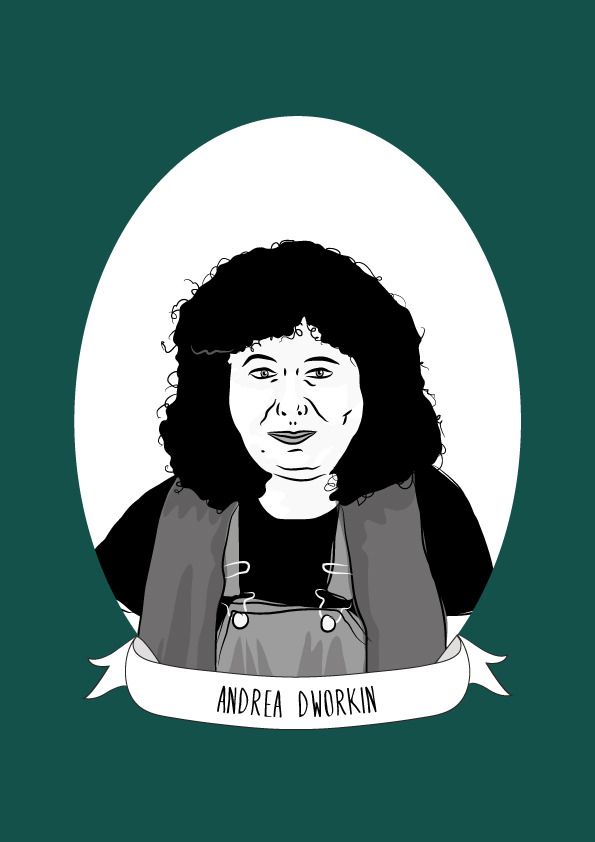Andrea Dworkin was an American feminist, author and outspoken critic of sexual politics, particularly the victimising effects she felt pornography had on women.
Dworkin’s father, an educator and socialist was a big influence on her and her interest in human rights and human dignity. Her mother believed in legal birth control and legal abortion long before this was usual and inspired Dworkin’s later activism. At 9 years old, Dworkin was raped.
Dworkin began writing poetry and fiction in the sixth grade, although she was undecided on whether to pursue this route or to become a lawyer. Writing won as she could “do it in a room alone” and no one could stop her. She was a prolific reader and was inspired by Arthur Rimbaud, Charles Baudelaire, Henry Miller, Fyodor Dostoevsky, Che Guevara, and the Beat poets, especially Allen Ginsberg. After graduating from high school in 1964, she attended Bennington College in New York. While at college, she was arrested at a anti-Vietnam War protest at the United States Mission to the United Nations and sent to the New York Women’s House of Detention. She later testified about her brutal treatment there which helped to get the jail shut down.
After finishing her degree, Dworkin married a Dutch activist and they worked together helping those who wished to avoid service in the Vietnam War. Her husband soon became abusive and she left him, only for him to continue to attack and harass her, following her to wherever she had hidden herself. She became a sex worker to survive while sleeping on people’s floors until she met the feminist Ricki Abrams. Abrams gave her shelter and introduced her to radical feminism. They began to write together and came up with drafts of a radical feminist text on the hatred of women in culture and history.
Dworkin returned to the United States, working as an anti-war organiser and participating in demonstrations for lesbian rights and against apartheid in South Africa. She joined a feminist consciousness raising group which focused on campaigns against violence against women and became a well known speaker at events organised by local feminist groups. In 1974 she completed the book she had started with Abrams. ‘Woman Hating’ was a book on feminist theory, in it she analysed a range of cultural phenomena, including fairy tales.
In February 1976, Dworkin was one of the leaders in organising public pickets of Snuff (it claimed to be an actual snuff film) in New York City. Later the same year she joined Adrienne Rich, Grace Paley, Gloria Steinem, Shere Hite, Lois Gould, Barbara Deming, Karla Jay, Letty Cottin Pogrebin, Robin Morgan, and Susan Brownmiller in attempting to form radical feminist anti pornography group. The group would go on to found Women Against Pornography in 1979 but Dworkin was not a part of it. She had different beliefs in how to approach the subject.
In 1981 she began her fight against pornography in ‘Pornography: Men Possessing Women, she claimed that pornography was a violation of women’s civil rights. She went on to teach a class with Catharine MacKinnon on the subject at the University of Minnesota. Together the women wrote a piece of legislation to classify pornography as a form of sex discrimination in Minneapolis but were unable to get the bill approved. They also worked together on a civil rights suit launched by a former porn star known as Linda Lovelace in the mid-1980s.
Dworkin published ‘Intercourse’, in which she explored the relationship between sex and violence in 1987. She argued that heterosexual intercourse is influence by the subordinate role women play in pornography and that all heterosexual sex in our patriarchal society is coercive and degrading to women. She claimed that sexual penetration may by its very nature doom women to inferiority and submission. She was criticised as many felt that she was saying that ‘all sex is rape’. She was also under harsh criticism for her size and looks.
In 2002 Dworkin wrote Heartbreak: The Political Memoir of a Feminist Militant to tell her own story. She suffered from poor health and died in April 2005. She was remembered at a special service at New York City’s New School of Social Research and honoured by Catharine MacKinnon and Gloria Steinem. Steinem said “In every century, there are a handful of writers who help the human race to evolve. Andrea is one of them.”
